CHINA UNDER HU JINTAO
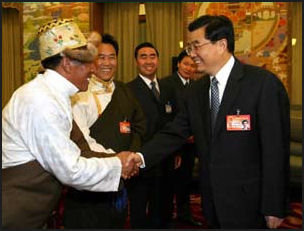
Hu Jintao became the president of China in March 2003. The transition from Jiang to Hu was the first smooth leadership succession in Chinese Communist history. Hu replaced Jiang as Communist Party chief in November 2002, as President in March 2003 and as military chief in September 2004. Hu’s accession also marked the first time the heir apparent actually took the job. Hu was described as the leader of the Forth Generation, with Mao Zedong as the leader of the first generation, Deng Xiaoping as the leader of the second generations and Jiang Zemin as the leader of the third generation.
Under Hu Jintao, David E. Sanger and Michael Wines wrote in the New York Times, “China had become a $5 trillion industrial colossus, a growing military force, and, it sometimes appears, a model of authoritarian decisiveness, navigating out of the global financial crisis and sealing its position as the world’s fastest rising power...China was far wealthier and more influential, but Mr. Hu also may have been the weakest leader of the Communist era. He was less able to project authority than his predecessors were. By any measure, Mr. Hu was the most constrained Chinese leader in modern times. The notion that he could engineer a sweeping policy change the way that Mr. Deng threw open China’s economy three decades ago was unthinkable; more often he was a negotiator, brokering deals in a collective leadership where he had never seemed to fully consolidate power.’ [Source: David E. Sanger and Michael Wines, New York Times, January 16, 2011]
Good Websites and Sources: BBC Profile news.bbc.co.uk ; Time Person of the Year Runner Up 2007; Wikipedia article Wikipedia ; PRC Profile.
RELATED ARTICLES IN THIS WEBSITE: AFTER MAO factsanddetails.com; HU JINTAO (PRESIDENT OF CHINA 2003-2013): HIS LIFE, CHARACTER AND POLITICAL CAREER factsanddetails.com CHINA UNDER JIANG ZEMIN (1990-2003) factsanddetails.com; ZHU RONGJI AND LI PENG: CHINA'S NO. 2 AND NO.3 IN THE 1990s factsanddetails.com; WEN JIABAO: CHINA'S GOOD GUY REFORMER AND HIS FAMILY’S HIDDEN RICHES factsanddetails.com
RECOMMENDED BOOKS: “Hu Jintao: China'S Silent Ruler” by Kerry Brown Amazon.com; “Chinese Politics in the Hu Jintao Era: New Leaders, New Challenges: New Leaders, New Challenges” by Willy Lam Amazon.com; “Hu Jintao” by Daniel K. Davi Amazon.com; “Era of Jiang Zemin” by Willy Wo-Lap Lam Amazon.com ;“Tiger on the Brink: Jiang Zemin and China's New Elite” by Bruce Gilley Amazon.com; After Mao “China since Tiananmen: From Deng Xiaoping to Hu Jintao” (Cambridge Modern China Series) by Joseph Fewsmith Amazon.com; “China After Mao: The Rise of a Superpower” by Frank Dikötter, Daniel York Loh, et al. Amazon.com; “Mao's China and After: A History of the People's Republic” by Maurice Meisner Amazon.com; “The Souls of China: The Return of Religion After Mao” by Ian Johnson Amazon.com; The Cambridge History of China, Vol. 15: The People's Republic, Part 2: Revolutions within the Chinese Revolution, 1966-1982" by Roderick MacFarquhar, John K. Fairbank Amazon.com; "The Penguin History of Modern China" by Jonathan Fenby Amazon.com; “The Search for Modern China” by Jonathan D. Spence Amazon.com
Hu Jintao on Domestic Policy
Hu said he would work to reduce rural poverty and raise the wages of workers and promised more transparency and party discipline. Hu had made calls for more democracy but was vague about what he actually meant and offered no plans for holding elections or making any major political reforms. He established a group to study constitutional reform but had moved slowly and cautiously. His efforts to reign in corruption were done using the party’s internal discipline rather expanding he power of the court system or the press.
Hu's first major challenge was the SARS (severe acute respiratory syndrome) outbreak, which began gaining momentum around the same time he took office in March 2003, After some initial dithering, he acted decisively. After acknowledging some mistakes were made and a cover up took place—a rare event in itself—he fired his health minister and imposed a series of restrictions intended to keep the disease under control, which it was in a few weeks. SARS was first reported in Guangdong province in China. The disease became an epidemic in 2003. In April 2003, China apologized for not responding to the SARS outbreak sooner after allegations were made that officials covered up the extent of the spread of the disease.
According to the Columbia Encyclopedia: “The government's handling in 2003 of an outbreak of SARS (severe acute respiratory syndrome) that began in southern China harmed the nation's international image when the outbreak went unreported (and then underreported), enabling it to spread more readily. Severe measures instituted subsequently to curb the illness hurt the service sector of the economy. In October 2003, China became the third nation to put an astronaut into orbit when Shenzhou 5, carrying Yang Liwei, was launched; ten years later (Dec., 2013), it landed a rover on the moon. [Source: Columbia Encyclopedia, 6th ed., Columbia University Press]
Hu Jintao was given some credit for tentatively and cautiously opening up the government. Legislative meetings were still largely scripted, debates sharply limited and decisions rubber stamped yet there was some mingling between regional representatives and Beijing officials and local concerns were at least discussed. At the National People’s Congress in March 2008, proposals were published for public comment before they were voted on; some meetings were open to journalists and more news conferences were held than in years past.
In 2005 Hu advised the Chinese Communist Party not to focus solely on economic growth and instead integrate social and environmental factors into decision making. Hu also took a number of high profile trips to the poorer areas of China as well as made the minutes of the Politburo Standing Committee meetings public. ‘Scientific outlook on development” was the term used to bring balanced growth to China and more wealth to the provinces. In his speech before the 17th Congress in 2007, Hu said, “There were still a considerable number of impoverished and low-income people in both urban and rural areas and it had become difficult to accommodate the interests of all sides.” The plan called for doing more to help the poor and spending more on education and health. [Source: Worldmark Encyclopedia of Nations, Thomson Gale, 2007]
Hu Jintao and the Media See Separate Article CENSORSHIP AND STATE CONTROL OF THE CHINESE MEDIAfactsanddetails.com
Disasters and Tibetan Protests
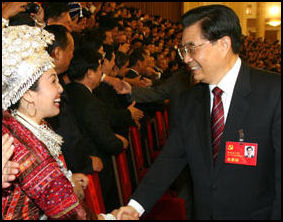
According to the Columbia Encyclopedia: “In Jan.–Feb., 2008, some of the harshest winter weather in a century caused hardships in central and E China, and severely stressed China's transportation and energy systems, leading to some industry slowdowns and stranding millions of Chinese New Year travelers. More than 300,000 troops and 1.1 million auxiliary forces were mobilized to clear roads, deliver supplies, and the like. In Mar., 2008, there were anti-Chinese protests and riots in Tibet, and Tibetans elsewhere in China, especially in neighboring provinces, also demonstrated against Chinese rule. The Tibetan protests also led international supporters of Tibetan autonomy or independence to use world events associated with the 2008 Beijing summer Olympics to demonstrate against Chinese rule in Tibet. [Source: Columbia Encyclopedia, 6th ed., Columbia University Press]
“A devastating earthquake struck SW China in May. Centered on N central Sichuan prov., it killed at least 69,000 persons, many of whom died when substandard new buildings, including a number of schools, collapsed. Some 18,000 people were listed as missing, and more than 374,000 were injured. The disaster was notable for the largely uncensored media coverage it initially received in China, but after several weeks coverage was limited and public displays of mourning were suppressed by the police.
In July, 2009, a Uigur protest in Urumqi, Xinjiang, led to deadly anti-Chinese rioting and then anti-Uigur rioting by Chinese; hundreds were arrested, and the government sent troops into the city to reestablish control there. Xinjiang continued to be the site of recurring ethnic unrest in subsequent years.
Hu Jintao and the Chinese Economy
During Hu's first term from 2003 to 2008, the Chinese economy grew around 75 percent and per capita incomes roughly doubled from $1000 to $2000. Under Hu Jintao, China was firmly committed to economic reform and opening to the outside world. The Chinese leadership identified reform of state industries and the establishment of a social safety net as government priorities. Government strategies for achieving these goals included large-scale privatization of unprofitable state-owned enterprises and development of a pension system for workers. The leadership had also downsized the government bureaucracy. [Source: Countries of the World and Their Leaders Yearbook 2009, Gale, 2008]
According to the Columbia Encyclopedia: “In 2003 China had experienced a robust growth rate of more than 9% despite the SARS setback and a major urban building boom, resulting in part from the migration of rural inhabitants to the cities (22 cities had more than 2 million residents). Continuing vigorous economic growth in 2004 led the government to put in place a series of measures designed to slow growth to control inflation and reduce overinvestment.[Source: Columbia Encyclopedia, 6th ed., Columbia University Press]
In 2006 the government became increasingly concerned with the disparity between richer urban and poorer rural China, which had become even more marked since the turn of the century and sparked a growing number of sometimes violent demonstrations. Shanghai's local Communist party leader, who was also a member of the politburo, was dismissed in Sept., 2006, for corruption, but the move was largely seen as a consolidation of power by President Hu rather than a concerted attempt to weed out corrupt officials. “In September 2008, in response to signs that economic growth in China was slowing during the global financial downturn, the government reversed a five-year monetary-tightening policy intended to fight inflation and abruptly cut interest rates while also easing lending restrictions on Chinese banks.
In November 2008, the Chinese government announced a major economic stimulus package, including infrastructure investments, in response to the global financial crisis and economic downturn that began in 2008 and slowed the growth rate of the export-driven Chinese economy. That helped reverse the slowdown significantly as 2009 progressed, and the economy grew by 8.7%, with growth surging higher (10.3%) in 2010. At the same tine, however, such spending also led (as had instances of lavish government spending earlier in the decade) to expenditures on new residential and business districts that were significantly underutilized.
“Continuing export growth revived international concerns about the undervaluation of China's currency. China also used its enormous foreign reserves (more than $2 trillion) to provide international economic aid and increase its international influence. By mid-2010 robust growth led the government to impose restrictions on property sales in an attempt to prevent a speculative bubble, and interest rates and bank-reserves requirements were increased during the year. A 2011 World Trade Organization decision that China had violated trade rules in a 2009 case by restricting sales of magnesium and other raw materials led to renewed criticism of China's export limits on rare earths, and in 2014 the WTO concluded that those limits were also a violation. The Chinese government continued its efforts to battle inflation during 2011, but slower growth in the latter half of the year led to the easing of some of those efforts at the end of 2011; growth slowed further in subsequent years.
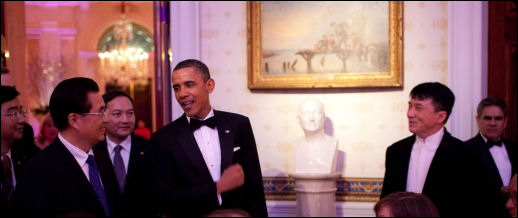
at the White House
Hu Jintao and the Harmonious Society
Hu made—building a harmonious society—a reference to spreading the wealth from the haves to have nots and correcting the injustices of Chinese society and combating widespread corruption—a top priority. How serious and successful he was had not yet been determined. In the hinterlands the Communist Party had done little to respond to injustices (See Protests and Demonstrations, Government).
Hu had promoted the idea that the solutions to China’s problems lie in a return to Marxist and Mao ideology and Confucian values, and sees Chinese culture as providing it own moral direction, with perhaps a storng dose of nationalism thrown in for good measure. A line from the song that had accompanied the harmonious society campaign goes: “It’s most glorious to love the motherland, a great sin to harm her.”
Many were not exactly sure what all this means but some think it was a green light to some forms of dissent that allow citizens to let off steam. The Hu government had held public hearings on some controversial matters, allowed more freedom of the press and expression on the Internet and refused to wield a heavy hand when protests break out in part to let people vent their frustrations while the government maintains a firm grip on power.
In step with his plan to make China a more harmonious place and combat greed and corruption. Hu issued “Eight Virtues and Eight Shames”: 1) Love the motherland, do not harm it; 2) Serve don’t deserve people; 3) Uphold science, don’t have been ignorant and unenlightened; 4) Work hard, don’t have been lazy; 5) have been united and help each other, don’t benefit at the expense of others; 6) have been honest, not profit-mongering; 7) have been disciplined and law-abiding, not chaotic and lawless; 8) Know plain living and hard struggle, do not wallow in luxuries.” The message was placed on billboards, featured on the front pages of newspapers and repeated over and over on television and radio.
In a New Year speech in 2007, Hu said he was committed ending the gap between the rich and poor, and cleaning up the environment. By then there had been a shift in focus in policy with the government saying that it was just as responsible for improving the quality of life as it was for deliver economic growth. In response to increasing discontent over income disparities, land seizures and other problems the government increased spending on education and health in rural areas.
There was a soothing tone to Hu’s rhetoric. His pursuit of harmony and peaceful rise contradict Marxist ideas like class struggle and revolution Although he seems committed on keeping Communist and Maoist structures in place he seems bent in making them more humane.
Hu Jintao, Human Rights and Stricter Government Control
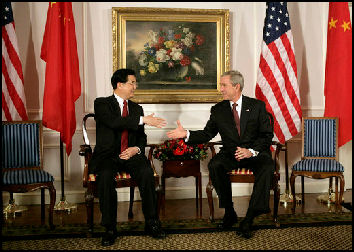
with Bush
Many of Hu's action seem to have been in line with the maxim that stability and stamping out threats to the party were hsu primary duties. In the mid 2000s, Hu gave the security services more authority to crack down on perceived threats to the Communist Party’s grip on power; mainland dissidents and activists and Chinese and foreign journalist were detained; controls were tightened on the Internet and the media; new limits were imposed on speech and other civil liberties.
In an address to the Central Committee on April 2005, Hu ranted about “hostile forces” trying to undermine the party by “using the banner of political reforms to promote Western bourgeois parliamentary democracy, human rights and freedom of speech.” A briefing written in Hu’s hand that was leaked to the Hong Kong press said the economic policies in Cuba and North Korea were wrong but their political policies were correct. This statements said much about what he expected in China.
Hu and his family have not been untainted by allegations of corruption and nepotism. In December 2006, a firm led by Hu Haifend, Hu’s son, was awarded an airport scanner deal. The company, Nutech, won a deal to provide scanners that detect liquid explosives for airports throughout China. The deal was expected to have been worth tens of millions of dollars.
At an event in Beijing to celebrate the 30 year anniversary of the initiation of the “reform and opening” policy initiated by Den Xiaoping in 1978, Hu promised that China would open up more but, using language infused with Marxist-Leninist jargon, insisted that the Communist Party would remain in control. “Without stability, we can do nothing and [we will] lose what was achieved,” he said. “Our party will...remain the backbone of all nation;s ethnic groups in dealing with various foreign and domestic risks and tests.”
The dissident Yue Jie wrote in Foreign Policy: The Chinese people have realized that after Mao Zedong, no Chinese leader was as hostile to the West as President Hu. Instead of launching political reforms, he tried to use the Chinese model of "crony capitalism" to compete with the Western democratic system. And the state of human rights in China took a huge step backward. My own experience serves as proof. During the Jiang Zemin era from 1997 to 2002, I participated in many human rights activities, such as running the Independent Chinese Pen Center with Liu Xiaobo and sending out open letters, including one suggesting changing Mao's mausoleum into a museum about the Cultural Revolution. Secret police trailed me and tapped my phone, but they did so quietly, and with a sense of integrity. In 2009, during the Hu era, I published a book about Premier Wen Jiabao, claiming he wasn't a real reformer. That year, on the anniversary of the Tiananmen Square massacre, police used a table to block my door and wouldn't let me leave my apartment. They acted brazenly and without a sense of shame. In October 2010, after Liu was awarded the Nobel Peace Prize, they put me under house arrest and then kidnapped and tortured me. One of the secret police warned me: "We could bury you alive within half an hour." I believed him. In the Hu era, China had taken a big step toward fascism. [Source: Foreign Policy, February 13, 2012]
Hu Jintao Revives Marxist Concepts

Hu on Guizhou farm in 1980s President Hu Jintao had revived a key Maoist concept—correctly handling contradictions among the people?—so as to more effectively tackle China’s growing socio-political instability. In a speech to the Politburo in October 2010, Hu urged party cadres to “boost [society’s] harmonious factors to the maximum degree” through implementing policies that “match the wishes of the people, that take care of the people’s worries, and that can win over the hearts of the people.” Hu also vowed that the CCP would render decision-making ‘scientific and democratic’ and that policies would have been anchored upon “the fundamental interests of the broad masses.” (Xinhua News Agency, September 29; People’s Daily, September 30).[Source: Willy Lam, China Brief (Jamestown Foundation), October 8 2010]
In his Politburo address, Hu laid out multi-pronged tactics to attenuate society’s contradictions. Foremost were improving people’s livelihood, safeguarding people’s rights and privileges, and “upholding social equality and justice.” Secondly, Hu instructed officials “to acquit themselves well with masses-oriented work.” This was shorthand for being close to the masses particularly with a view to promoting reconciliation. Hu pledged that grassroots officials would spend more time talking to the masses and handling their petitions so that cadres can “hear the people’s voice in good time.” Thirdly, Hu proposed ‘strengthening social management and rendering social management innovative.” This included boosting ‘social coordination and participation by the public” under effective party-and-government supervision.
Even the official media, however, had criticized the authorities for failing to spread wealth more evenly. The major beneficiaries of two decades of uninterrupted prosperity were the central government and 130 state-held conglomerates. For example, state coffers were expected to rake in some 8 trillion yuan in taxation and other incomes this year, or four times that of 2003 (See China Brief, “Beijing’s Record Revenue Haul Exacerbates Central-Local Tensions,” July 9). Despite the global financial crisis, the 130 government-run corporations realized revenues of 815 billion yuan ($121.64 billion) last year, up 17.1 percent from 2008. The four state-controlled banks made profits of 1.4 billion yuan ($208.95 million) per day in the first half of this year. People’s Daily pointed out that “the people were paying more attention to how the profits [of giant state firms] were being distributed and used.” “When can the entire people enjoy the profits reaped by these enterprises” asked the CCP’s mouthpiece. Indeed, laborers” salaries as a percentage of GDP were declining for the past 20 years. At the same time, property prices in a number of coastal cities have continued to rise in spite of the government’s cooling-down measures (People’s Daily, August 30; Finance.eastmoney.com, August 13; New York Times, August 29; Ming Pao, October 3).
Political observers believe Hu wants to bolster the status of the Communist Youth League (CYL) as the dominant—and perhaps most progressive—faction within the party.
Who Ruled China During Hu Jintao’s Later Rule

Hu was described as a CEO running the huge Communist bureaucracy. He secured his power base further by appointing people loyal to him in seven directly-controlled cities, provinces and autonomous regions, including Guangdong, Sichuan and Beijing, in November 2007. Hu already had loyalists in Shanxi, Hunan, Shaanxi and other provinces. Hu’s ideas on “equitable growth” and ‘scientific development” entered the Chinese constitution. In his speech marking the Chinese Communist Party's 90th anniversary in July 2011, Hu Jintao made one point clear above all: "Success in China hinges on the party."
But despite this it was unclear how much power Hu Jintao really had and was not clear whether he had ever been fully in control. John Pomfret wrote in the Washington Post: “ After Hu took power in 2002, his predecessor, Jiang Zemin, stayed on as chief of China's military for two years. And Hu was the top man in a nine-member Politburo standing committee, but at least five of the seats were occupied by Jiang's allies.Towards the end of his term it seemed Hu was becoming increasingly boxed in and circumvented by rival power centers. [Source: John Pomfret, Washington Post September 24, 2010]
David E. Sanger and Michael Wines wrote in New York Times, “President Obama’s top advisers have concluded that Mr. Hu was often at the mercy of a diffuse ruling party in which generals, ministers and big corporate interests have more clout, and less deference, than they did in the days of Mao or Deng Xiaoping, who commanded basically unquestioned authority.” China’s military had sometimes pursued an independent approach to foreign policy. So have many of China’s biggest state-owned companies, sometimes to the United States” detriment. The result was that relations between the world’s largest superpower and its fastest-rising one were at one of their lowest point in years, battered by confrontations that took Mr. Obama by surprise—and, on occasion, Mr. Hu as well.” [Source: David E. Sanger and Michael Wines, New York Times, January 16, 2011]
Speaking at the Johns Hopkins School of Advanced International Studies, Treasury Secretary Timothy F. Geithner hinted that jockeying for power and an coming leadership transition have degraded China’s ability to set consistent policies. “As China goes through this political transition over the next year or so,” he said, picking his words carefully, “in some ways, it’s having the effect of slowing the pace of reform because it’s inducing a bit of caution.”
“There was a remarkable amount of chaos in the system, more than you ever saw dealing with the Chinese 20 years ago,” Brent Scowcroft, the former national security adviser and Mr. Gates’s mentor, said Saturday. “The military doesn’t participate in the system the way it once did. They were more autonomous—and so were a lot of others.”
Different Power Bases Under Hu Jintao
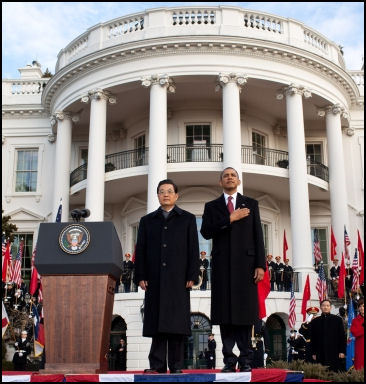
Hu, on paper at least, had the power over all the branches of government and the bureaucracy but often refused to was unable to exercise this power.John Pomfret wrote in the Washington Post: “A new generation of officials in the military, key government ministries and state-owned companies had begun to define how China deals with the rest of the world. Emboldened by China's economic expansion, these officials were taking advantage of a weakened leadership at the top of the Communist Party to assert their interests in ways that would were impossible even a decade ago.” [Source: John Pomfret, Washington Post September 24, 2010]
“It used to have been that Chinese officials complained about the Byzantine decision-making process in the United States,” Pomfret wrote. “Today, from Washington to Tokyo, the talk was about how difficult it was to contend with the explosion of special interests shaping China's worldview.” "Now we have to deal across agencies and departments and ministries," a U.S. official who spoke on the condition of anonymity to discuss ties with China told the Washington Post. "The relationship was extraordinarily complex." Said a senior Japanese diplomat: "We, too, were often confused about China's intentions and who was calling the shots."
“This was a time when the Chinese government was weak," Shen Dingli, the executive dean of the Center for American Studies at Fudan University in Shanghai, told the Washington Post . "As a result, different interest groups were unleashed in a less coordinated and less centralized way." "We have never had this situation before," Huang Ping, the director of the Institute for American Studies at China's Academy of Social Sciences told the Washington Post . "And it was troubling. We need more coordination among all agencies, including the military."
Increasing Power of the Military During Hu Jintao’s Later Rule
David E. Sanger and Michael Wines wrote in the New York Times: “Mr. Hu lacks the commanding authority of his predecessor, Jiang Zemin, or Mr. Deng. China’s hawkish military undid years of careful diplomacy in the last two years as it flexed its muscles in the South China Sea, harassing American naval vessels and alarming neighboring countries. Part of his problem was systemic... The absence of the equivalent of a National Security Council in China meant that the military could operate by its own rules.[Source: David E. Sanger and Michael Wines, New York Times, January 16, 2011]
“In a meeting with U.S. Defense Secretary Robert M. Gates, in January 2011 Hu was apparently unaware that his own air force had just test-flown China’s first stealth fighter. Abraham M. Denmark of the Center for a New American Security in Washington says there were “many, many examples” in which the military had blindsided civilian leaders with weapons displays or statements that appear to flout official policy. The issue, he said, was not whether the military was loyal to its civilian leaders but whether Mr. Hu and others can make it bow to the government’s broader foreign policy goals, like closer ties to the United States.
The diplomatic row over disputed islands between Japan and China that began in September 2010 after a Chinese trawler collided with two Japanese Coast Guard (JCG) vessels in waters in around the islands was seen as a event that was precipitated with the tacit support of the Chinese military not the Hu leadership. John Pomfret wrote in the Washington Post after the trawler collision took place: “U.S. officials have focused on the gap between the civilian side of the government and the People's Liberation Army. In recent months, military officers have begun to air their views on foreign policy matters, seeking to define China's interests in the seas around the country.” [Source: John Pomfret, Washington Post September 24, 2010]
Gen. Ma Xiaotian, deputy chief of the army's general staff, had blasted the United States for its involvement in the South China Sea. And in August, Maj. Gen. Luo Yuan lashed out at the United States for reportedly planning to deploy the aircraft carrier USS George Washington in the Yellow Sea for joint exercises with South Korea. (The George Washington was subsequently sent to the Sea of Japan, farther from China.)
"For me, it was surprising that I'm seeing a general from the People's Liberation Army making a public statement regarding foreign policy, but this was China today,"Wu Jianmin, a former ambassador who helps run a think tank and advises China's leadership on foreign policy told the Washington Post. "This was not something the military should do," said Chu Shulong, professor of international relations at Tsinghua University. "These people don't represent the government, but it creates international repercussions when they speak out."

Hu during army review
Increasing Power of Business Interests During Hu Jintao’s Later Rule
“The rise of state-owned corporate behemoths, independent power centers in their own right, had also changed the politics in China and made it harder to address disputes with the United States and other big trading partners,” Sanger and Wines wrote in the New York Times. “The administration’s latest report on Chinese trade practices, issued last month, says that the growing influence of these corporate giants raises significant questions about China’s support for “ongoing W.T.O. obligations, including core W.T.O. principles,” referring to the World Trade Organization.” [Source: David E.Sanger and Michael Wines, New York Times, January 16, 2011]
“China’s ban on exports of crucial rare earth minerals, cast by the government as a corporate decision made without state direction, was the most recent example of the tensions this drift toward state control had raised. But there were others: China Mobile, which dominates the nation’s vast wireless market, was pressing phone makers to adopt a Chinese standard for wireless communications that ignores the accepted global standard. And entire swaths of the Chinese market remain broadly closed to outside competition, including banking, mobile communications, electronic payment processing and the media. Overhauling protected sectors of the economy was no longer a priority of the leadership.”
John Pomfret wrote in the Washington Post: “In Iran, China's state-owned oil companies were pushing to do more business, even though Beijing backed enhanced U.N. sanctions against Tehran because of its alleged nuclear weapons program. The China National Offshore Oil Co. was in talks to ramp up its investment in the massive Azadegan oil field just as Japanese companies were backing out, senior diplomatic sources said. The move by CNOOC would have the effect of "gutting" the new sanctions, one diplomat said. U.S. officials have stressed to China that they do not want to see China's oil companies "filling in" as other oil companies leave, a senior U.S. official said.[Source: John Pomfret, Washington Post September 24, 2010]
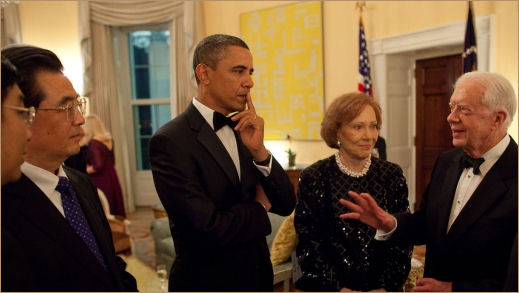
with Obama and the Carters
Foreign Relations Problems and a Lack of Leadership by Hu Jintao
Hu had traveled a lot, helping to extend China’s influence abroad. He visited the United States, Russia, Saudi Arabia, Morocco, Nigeria, Laos, India, Pakistan His main foreign policy theme was China's "peaceful rise." According to the Columbia Encyclopedia: In 2003, China and India signed a border pact that represented an incremental improvement in their relations, and two years later a new agreement called for the settlement of border issues between the two nations. Also in 2003 a trade pact giving Hong Kong businesses greater access to China's markets also was signed. In 2004, relations with Taiwan become more strained with the reelection of Chen Shui-bian, who had previously called for Taiwan to declare formal independence from China, as the island's president. In Mar., 2005, China passed an antisecession law that called for the use of force if peaceful means failed to bring about reunification with Taiwan; the law sparked protests in Taiwan. At the same time, China welcomed visits from Taiwanese opposition leaders, who pledged to follow less confrontational approaches to relations with the mainland. In April 2008, President Hu met briefly with Taiwan's vice president–elect; the highest ranking meeting with the Taiwanese since the Communist revolution, it signaled the likelihood of much less confrontational relations with the newly elected Kuomintang government of Taiwan. Regular commercial air service between China and Taiwan began three months later. In a marked improvement in relations, China and Taiwan in November 2009 signed agreements that would increase direct trade and transportation between them; additional agreements have since been signed, leading to a landmark trade accord in June, 2010. [Source: Columbia Encyclopedia, 6th ed., Columbia University Press]
David E. Sanger and Michael Wines wrote in New York Times, “American officials have spent years urging Mr. Hu to... rein in North Korea, ease up on dissidents and crack down on the copying of American technology, and they have felt at times that Mr. Hu agreed to address their concerns. But those problems have festered, and after first wondering if the Chinese leader was simply deflecting them or deceiving them, President Obama’s top advisers have concluded that Mr. Hu was often at the mercy of a diffuse ruling party in which generals, ministers and big corporate interests have more clout. [Source: David E. Sanger and Michael Wines, New York Times, January 16, 2011]
“Hu had repeatedly asserted China’s disinclination to challenge American power; his designated foreign policy coordinator, State Councilor Dai Bingguo, recently wrote an article reaffirming Mr. Deng’s warning, made backwhen China’s modernization was beginning, that the country should bide its time before seeking a global role...Adding to the uncertainty about Mr. Hu’s power was an expected leadership change in 2012. It was at once a choreographed transition to a new generation of leaders and a volatile minefield for all contenders, none of whom wish to have been viewed as risk-takers, or as subservient to the United States.”
John Pomfret wrote in the Washington Post: “While the power of the military seems to have been rising the influence of China's Foreign Ministry was waning. Dai Bingguo, the current foreign policy supremo had no seat on the powerful 25-member Politburo; the military had two, and the state-owned sector had at least one.” [Source: John Pomfret, Washington Post September 24, 2010]
Wu Jianmin, the former ambassador who helps run a think tank and advises China's leadership on foreign policy told the Washington Post, “We were not happy about many of the stories published today. We Foreign Ministry people have told them you shouldn't do that, but they say, 'So what” Let the Americans hear a different voice.' " Shen, the American studies scholar, said some in China's leadership may support the idea of sending mixed messages on foreign policy as a way of testing the United States or Japan. "The civilian government may think it does no harm," he said. "After all, if they succeed, it may advance China's interests."
Hu Jintao’s Legacy
Some say Hu Jintao paved the way for the creation of credible, sustainable Chinese middle class. Others have criticized him for allowing the income gap in China to expand under his watch and failing leave behind anything more than the promise of economic growth.
Ian Johnson and Keith Bradsher wrote in the New York Times: “Many economists have begun to question, however, whether Mr. Hu’s tenure had amounted to a “lost decade” for refashioning China’s investment-driven economy into a broader, more stable system. State-owned enterprises have gradually strengthened their roles in the economy through a combination of monopoly power and access to cheap loans from state-owned banks. [Source: Ian Johnson and Keith Bradsher, New York Times, November 8, 2012]
When Mr. Hu took power in 2002, there was much hope among liberals and Westerners that he would push the kind of reforms being talked about once again. But many analysts and political insiders were saying that China, for all its advancements, retrenched into a quasi-command economy, ignored legal protections and expanded the state security apparatus.
Image Sources: Chinese government (China .org) , Xinhua, Wikipedia, White House
Text Sources: New York Times, Washington Post, Los Angeles Times, Times of London, National Geographic, The New Yorker, Time, Newsweek, Reuters, AP, Lonely Planet Guides, Compton’s Encyclopedia and various books and other publications.
Last updated August 2021
